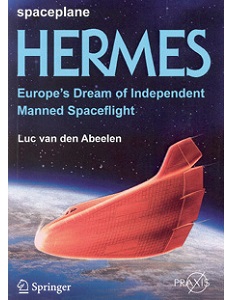Sadly, even today’s young space engineers are more likely to associate the name Hermes with a European parcel delivery service or French scarf supplier than with a spaceplane… which is one good reason why this book is a welcome addition to the literature! As Europe’s Ariane 5 launch vehicle nears retirement, it is worth remembering that – in addition to its role as a satellite launcher - it was originally designed to carry the manned spaceplane Hermes.
This comprehensive history covers everything from the Hermes concept and proposal phase to the complex reasons for its eventual demise. Other aspects among the 26 chapters include astronaut training, spacesuits and escape systems, along with details of the thermal protection system and proposed communications segment via the data relay satellite (DRS). The book is illustrated with colour photos and line drawings and benefits from a 10-page abbreviation list and 12-page, double-column index.
Given that this is a story with a known and arguably depressing end, the author recognises the importance of the post mortem: “one all-important question emerges”, he says. “How could an ambitious project such as this, started with such enthusiasm and surrounded by so much excitement, collapse and founder?”. As usual – and there are plenty of other examples in space technology development – it comes down to a mix of technical challenges, politics and cost. At the turn of the century, it was clear that manned shuttle vehicles were more-or-less passé and that conical capsules were the favoured (albeit retro) design. No-one knows whether Europe will one day return to the concept of a spaceplane, but if they do this book will be waiting for that generation of engineers to consult (hopefully with better results).











